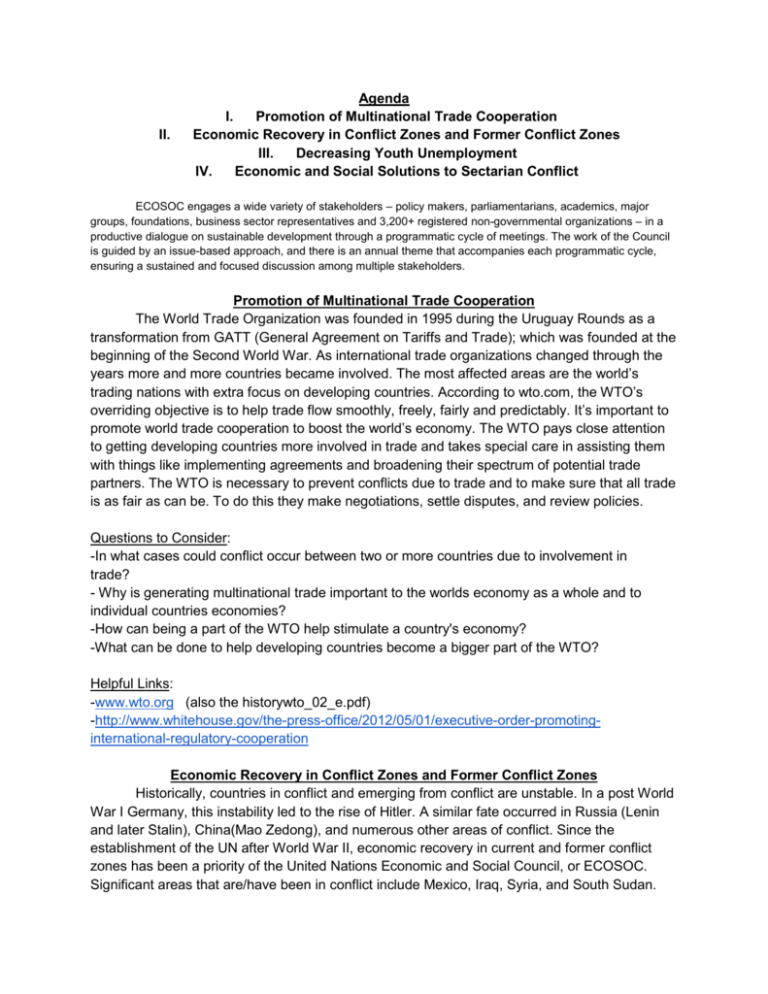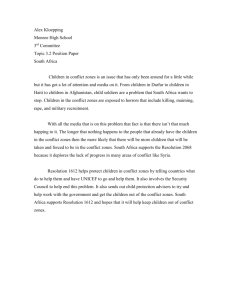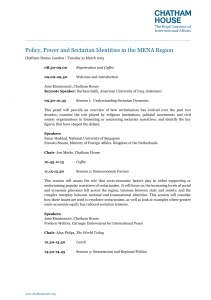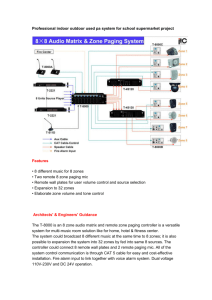Economic Recovery in Conflict Zones and Former Conflict Zones
advertisement

II. Agenda I. Promotion of Multinational Trade Cooperation Economic Recovery in Conflict Zones and Former Conflict Zones III. Decreasing Youth Unemployment IV. Economic and Social Solutions to Sectarian Conflict ECOSOC engages a wide variety of stakeholders – policy makers, parliamentarians, academics, major groups, foundations, business sector representatives and 3,200+ registered non-governmental organizations – in a productive dialogue on sustainable development through a programmatic cycle of meetings. The work of the Council is guided by an issue-based approach, and there is an annual theme that accompanies each programmatic cycle, ensuring a sustained and focused discussion among multiple stakeholders. Promotion of Multinational Trade Cooperation The World Trade Organization was founded in 1995 during the Uruguay Rounds as a transformation from GATT (General Agreement on Tariffs and Trade); which was founded at the beginning of the Second World War. As international trade organizations changed through the years more and more countries became involved. The most affected areas are the world’s trading nations with extra focus on developing countries. According to wto.com, the WTO’s overriding objective is to help trade flow smoothly, freely, fairly and predictably. It’s important to promote world trade cooperation to boost the world’s economy. The WTO pays close attention to getting developing countries more involved in trade and takes special care in assisting them with things like implementing agreements and broadening their spectrum of potential trade partners. The WTO is necessary to prevent conflicts due to trade and to make sure that all trade is as fair as can be. To do this they make negotiations, settle disputes, and review policies. Questions to Consider: -In what cases could conflict occur between two or more countries due to involvement in trade? - Why is generating multinational trade important to the worlds economy as a whole and to individual countries economies? -How can being a part of the WTO help stimulate a country's economy? -What can be done to help developing countries become a bigger part of the WTO? Helpful Links: -www.wto.org (also the historywto_02_e.pdf) -http://www.whitehouse.gov/the-press-office/2012/05/01/executive-order-promotinginternational-regulatory-cooperation Economic Recovery in Conflict Zones and Former Conflict Zones Historically, countries in conflict and emerging from conflict are unstable. In a post World War I Germany, this instability led to the rise of Hitler. A similar fate occurred in Russia (Lenin and later Stalin), China(Mao Zedong), and numerous other areas of conflict. Since the establishment of the UN after World War II, economic recovery in current and former conflict zones has been a priority of the United Nations Economic and Social Council, or ECOSOC. Significant areas that are/have been in conflict include Mexico, Iraq, Syria, and South Sudan. The source of conflict in these countries isn’t entirely attributed to economic reasons, but it is the hope of the United Nations Economic and Social Council, that creating a stable economy will help to mitigate any future conflicts. ECOSOC believes that, in order to provide stability in countries, a stable economy has to be the foundation. This economic stability is especially important in countries that are the most susceptible to instability, namely current and former conflict zones. ECOSOC supports NGOs, or non-governmental organizations, in order to assist in funding the development of countries in current and former conflict zones. This money is assigned to specific sectors of the economy, supplementing it and planting the seeds for economic growth. Questions to Consider: - How does economic stability help propagate political and social stablity? - Can you define a conflict zone looking only at the economic conditions? - What constitutes a development program according to ECOSOC and the broader UN? - What are some important conflict zones that have been aided by the United Nations Economic and Social Council? Helpful Links: -http://users.ox.ac.uk/~econpco/research/pdfs/IPA-PostConflictEconomicRecovery.pdf -http://www.undp.org/content/dam/undp/library/crisis%20prevention/undp-cpr-post-conflicteconomic-recovery-enable-local-ingenuity-report-2008.pdf Decreasing Youth Unemployment Youth unemployment has always been a problem, but recently has taken a turn for the worse. During times of economic crisis people of all ages were cut from work. Now as each generation grows and the youth population gets bigger and bigger there are not enough jobs to sustain a population of this size. According to economicshelp.org there are eight main reasons why youth are unemployed. Some include lack of qualifications and geographical unemployment. Many young people just do not have the necessary qualifications needed to get higher level jobs. Geographical unemployment is also a big issue. Sometimes people are unemployed because they live in areas where there is no economic development. Youth unemployment affects all areas of the world, both developed and undeveloped countries. If left unsolved young people will not have the necessary job experience required to take on major jobs. The current generation of youths is the biggest the world has ever seen, and each future generation will only grow. By ignoring this issue, we will have major problems in the with lack of qualified leaders. With no economic growth in any areas (rural or urban), towns and cities are at risk of economic stagnation. The UN has held forums inviting youth population from many countries to voice their opinions about what to do and how to solve it. Most of the forums include many countries getting together to share ideas and implement global change to help current and future job trends. Questions to Consider: -Why is it important (economically and socially) to generate more jobs for the youth population? -What happens in communities/cities with low youth employment rates? -Does what has happened in the past with economic/employment trends dictate what will happen in the future? -Consider the role of education in youth employment: how do they support eachother? Helpful Links: http://m.theatlantic.com/business/archive/2013/05/europes-record-youth-unemployment-thescariest-graph-in-the-world-just-got-scarier/276423/ http://www.economicshelp.org/blog/517/economics/reasons-for-youth-unemployment/ www.economicshelp.org http://www.un.org/en/ecosoc/ Economic and Social Solutions to Sectarian Conflict Sectarianism is a global issue that has existed throughout history. Naturally, conflicts have arisen from this sectarianism, due in part to differing religious and political opinions and ideologies. Until recently, little has been done regarding the subject, but it has now become a prominent subject of the United Nations Economic and Social Council. The Middle East is a particularly affected region, due to the sects that exist in Islam (more specifically the division that exists between Sunni and Shia Muslims) and the role of religion in government. In regions where conflict is always a threat, economic growth and stability are less achievable. Sectarian conflict affects people both inside and outside of the affected region, especially in the Middle East. Many people in these politically unstable areas have poor standards of living. Agencies like the UN and national governments are constantly aiding refugees that have been displaced due to sectarian conflict. Governments like the United States have a standing military force in some of these places either to help end conflict or help aid refugees. The economies of these places deteriorate due to sectarianism; often times people are forced to leave either their jobs or homes and their businesses suffer. Questions to Consider: - Why is the Middle East more prone to Sectarian Conflict? What is the history behind the conflicts? -What has been done in the past to solve sectarian conflicts? Have they worked? Why or why not? -How does sectarian conflict affect the international community? -Why is it important for countries not directly involved in the conflict to intervene? Helpful Links: http://www.un.org/en/ecosoc/ http://www.whitehouse.gov/the-press-office/2014/09/24/remarks-president-obama-addressunited-nations-general-assembly




